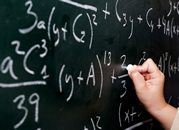Algebra Tutors

Pre-Algebra, Algebra 1, and Algebra 2 all require you to master new math skills. Do you find solving equations and word problems difficult in Algebra class? Are the exponents, proportions, and variables of Algebra keeping you up at night? Intercepts, functions, and expressions can be confusing to most Algebra students, but a qualified tutor can clear it all up! Our Algebra tutors are experts in math and specialize in helping students like you understand Algebra. If you are worried about an upcoming Algebra test or fear not passing your Algebra class for the term, getting an Algebra tutor will make all the difference.
Pre-algebra - The goal of Pre-algebra is to develop fluency with rational numbers and proportional relationships. Students will: extend their elementary skills and begin to learn algebra concepts that serve as a transition into formal Algebra and Geometry; learn to think flexibly about relationships among fractions, decimals, and percents; learn to recognize and generate equivalent expressions and solve single-variable equations and inequalities; investigate and explore mathematical ideas and develop multiple strategies for analyzing complex situations; analyze situations verbally, numerically, graphically, and symbolically; and apply mathematical skills and make meaningful connections to life's experiences.
Algebra I - The main goal of Algebra is to develop fluency in working with linear equations. Students will: extend their experiences with tables, graphs, and equations and solve linear equations and inequalities and systems of linear equations and inequalities; extend their knowledge of the number system to include irrational numbers; generate equivalent expressions and use formulas; simplify polynomials and begin to study quadratic relationships; and use technology and models to investigate and explore mathematical ideas and relationships and develop multiple strategies for analyzing complex situations.
Algebra II - A primary goal of Algebra II is for students to conceptualize, analyze, and identify relationships among functions. Students will: develop proficiency in analyzing and solving quadratic functions using complex numbers; investigate and make conjectures about absolute value, radical, exponential, logarithmic and sine and cosine functions algebraically, numerically, and graphically, with and without technology; extend their algebraic skills to compute with rational expressions and rational exponents; work with and build an understanding of complex numbers and systems of equations and inequalities; analyze statistical data and apply concepts of probability using permutations and combinations; and use technology such as graphing calculators.
College Algebra – Topics for this course include basic concepts of algebra; linear, quadratic, rational, radical, logarithmic, exponential, and absolute value equations; equations reducible to quadratic form; linear, polynomial, rational, and absolute value inequalities, and complex number system; graphs of linear, polynomial, exponential, logarithmic, rational, and absolute value functions; conic sections; inverse functions; operations and compositions of functions; systems of equations; sequences and series; and the binomial theorem.
For most students success in any math course comes from regular studying and practicing habits. However, Algebra class can be a foreign language for many students. Whether you are in need of a little extra help or someone who can teach the subject from scratch, hiring a professional tutor with a strong background in mathematics can make a dramatic impact on a student’s performance and outlook on all future course work.
Elementary Tutors
The basic learning blocks of every child's education are built in elementary school. It is here that a life long love for learning is fostered. The fundamental reading, writing, and math skills are introduced to your child for the first time in elementary school. In order to be successful, elementary students need to master basic listening and study skills. Elementary school should be a positive, nurturing environment where children are introduced to learning.
Our Tutoring Service
Every Advanced Learners tutor is a highly qualified, college-degreed, experienced, and fully approved educator. You can feel secure knowing that each tutor has been thoroughly pre-screened and approved. We have stringent requirements for all of our tutors. We require a national background check, a personal interview, and both personal and professional references of each applicant. We select only the very best tutors for our clients to choose from. Your personalized list of matched tutors will include professionals specifically suited to your child’s current academic needs. The backgrounds of our tutors are varied and their experience diverse, but the common factor is the passion for learning and education that they all share. As our client, you have the opportunity to review and speak with as many tutors as you wish until you find the right match for your student.